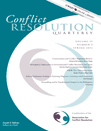
Conflict Resolution Quarterly
Scope & Guideline
Exploring the complexities of conflict and resolution.
Introduction
Aims and Scopes
- Interdisciplinary Approaches to Conflict Resolution:
The journal publishes research that draws from various fields such as sociology, psychology, law, and political science, providing a comprehensive understanding of conflict dynamics and resolution strategies. - Empirical Research and Case Studies:
It emphasizes empirical studies that explore real-world conflicts, offering insights into effective resolution practices and the impacts of interventions in diverse settings. - Focus on Marginalized Voices:
The journal highlights the experiences and perspectives of marginalized groups in conflict situations, promoting inclusivity and understanding in peacebuilding efforts. - Innovative Conflict Resolution Strategies:
Research on novel approaches to conflict resolution, including restorative justice, mediation, and community engagement, is a core focus, aiming to improve existing methodologies. - Cultural and Contextual Sensitivity:
There is a consistent emphasis on the importance of cultural contexts and local practices in conflict resolution efforts, acknowledging the diversity of conflict experiences globally.
Trending and Emerging
- Youth and Education in Conflict Resolution:
A growing focus on the role of youth and educational settings in conflict resolution highlights the importance of early intervention and the development of conflict management skills among young people. - Restorative Justice Practices:
There is an increasing interest in restorative justice as a viable alternative to traditional punitive measures, with research exploring its application in various contexts, including schools and community settings. - Psychosocial Dimensions of Conflict:
Emerging studies emphasize the psychosocial aspects of conflict, particularly how emotional and psychological factors influence conflict dynamics and resolution strategies. - Community-Based Conflict Resolution:
Research is increasingly focusing on community-driven approaches to conflict resolution, promoting local engagement and participation as essential elements in peacebuilding efforts. - Intersectionality in Conflict Studies:
There is a rising trend in examining conflicts through an intersectional lens, considering how various identities and social factors intersect to shape conflict experiences and resolutions.
Declining or Waning
- Traditional Legal Approaches to Conflict:
There has been a noticeable reduction in papers focusing solely on traditional legal frameworks for conflict resolution, possibly due to a growing preference for more holistic and community-based approaches. - Theoretical Overviews without Empirical Data:
Papers that provide theoretical analyses without empirical backing seem to be less frequent, indicating a trend towards research that is grounded in practical applications and case studies. - Focus on Individual Conflict Resolution:
Research centered on individual-level conflict resolution strategies appears to be waning, as the journal shifts towards exploring systemic and collective approaches to conflict management. - Historical Conflict Analysis:
While historical perspectives are valuable, there seems to be a decreasing emphasis on historical analyses of conflicts, with more recent publications favoring contemporary issues and solutions. - Narrow Geographical Focus:
There is a decline in studies focused on specific geographical areas or localized conflict issues, suggesting a move towards broader, more global analyses of conflict and resolution.
Similar Journals
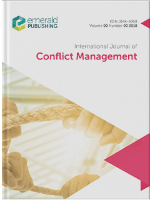
INTERNATIONAL JOURNAL OF CONFLICT MANAGEMENT
Navigating the Complexities of Conflict ResolutionWelcome to the International Journal of Conflict Management, a leading peer-reviewed publication that delves into the complexities of conflict and its resolution within various organizational contexts. Published by Emerald Group Publishing Ltd, this journal serves as an essential resource for researchers, professionals, and students engaged in the fields of communication, management of technology and innovation, and strategic management. With a robust impact factor and a commendable ranking in Q1 and Q2 quartiles, it provides critical insights and fosters innovative discussions aimed at enhancing understanding and practices related to conflict management. As of 2023, it ranks in the top 15% in Communication and holds significant positions in the Management of Technology and Innovation and Strategy and Management categories, making it a vital platform for advancing scholarly dialogue and practical applications. Although the journal is not open access, its rich content from 1990 to 2024 is accessible to contributing members of these dynamic fields, ensuring you stay at the forefront of contemporary research. This journal not only nurtures academic inquiry but also serves as a bridge between theory and practice in conflict resolutions, fostering collaboration across disciplines.

International Journal on Minority and Group Rights
Transforming academic insights into advocacy for minority rights.International Journal on Minority and Group Rights is a distinguished academic journal published by BRILL, focusing on the vital areas of minority rights and group dynamics within the realms of Political Science, International Relations, and Geography. Established in 1993, the journal has continually evolved, offering essential insights and scholarly discussions pertaining to the rights of marginalized communities globally. With a significant impact in its field, it currently holds a Q3 rating in both Geography, Planning and Development and Political Science and International Relations as of 2023, reflecting its commitment to contributing to critical academic dialogues. While it operates under a subscription model, the journal makes a concerted effort to engage academic audiences by publishing high-quality research that addresses contemporary issues related to minority rights and inclusivity. Researchers, students, and professionals are encouraged to explore its enlightening articles that not only assess existing frameworks but also propose innovative approaches for safeguarding minority rights.

International Journal of Conflict and Violence
Connecting scholars to drive impactful conversations on societal challenges.International Journal of Conflict and Violence is a distinguished scholarly publication dedicated to fostering interdisciplinary research and discourse in the realms of law, sociology, and political science. Published by INST INTERDISCIPLINARY RES in Germany, this Open Access journal has been a vital platform for knowledge exchange since its inception in 2007, allowing unrestricted access to crucial research findings. With a significant E-ISSN of 1864-1385, it aims to address complex issues surrounding conflict and violence, contributing to the understanding and resolution of societal disputes. As of 2023, it proudly holds a Q1 ranking in Law and a Q2 ranking in Sociology and Political Science, underscoring its impact and relevance within the academic community, evidenced by its impressive 95th percentile rank in Social Sciences - Law and 87th percentile rank in Sociology and Political Science according to Scopus metrics. Researchers, professionals, and students alike will find the journal’s commitment to high-quality research and its comprehensive scope essential for advancing their understanding of conflict dynamics and their implications for society.

Economics of Peace and Security Journal
Bridging Economics and Peace for Lasting SolutionsEconomics of Peace and Security Journal, published by ECONOMISTS PEACE & SECURITY, serves as a critical platform for scholarship focusing on the intersections of economics, peacebuilding, and international relations. With an ISSN of 1749-852X, this interdisciplinary journal aims to explore the economic dimensions of peace and security, fostering a deeper understanding of how economic policies can influence stability worldwide. Despite its current standing in the Q4 quartile across various categories, including Economics and Political Science, the journal plays an essential role in advancing research on pressing global issues. By providing insightful analyses and empirical studies, it engages researchers, students, and policymakers in discussions that can lead to effective strategies for conflict resolution and sustainable economic practices. Although it currently offers limited access options, the aspirations for broader dissemination underscore its importance in contributing to the ongoing dialogue surrounding peace and security economics. Join the conversation and contribute to this evolving field as it navigates a complex and dynamic global landscape.
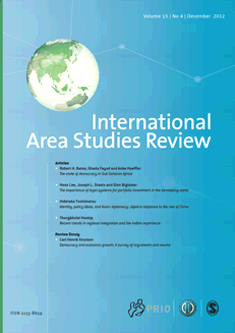
International Area Studies Review
Navigating the Complexities of International RelationsInternational Area Studies Review is a pivotal journal in the fields of Political Science, International Relations, and Sociology, published by SAGE Publications Ltd. With an ISSN of 2233-8659 and an E-ISSN of 2049-1123, this journal serves as a distinguished platform for scholarly discourse, exploring the complexities of international affairs and area studies since its inception in 1997. Housing contributions that bridge theoretical perspectives and empirical research, it plays a critical role in advancing knowledge and understanding within its domain. Currently ranked in the Q3 category for both Political Science and Sociology, the journal demonstrates consistent scholarly engagement, reflected in its Scopus rankings, with a notable position in the 55th percentile for Political Science and International Relations. While not open access, the International Area Studies Review remains a vital resource for researchers, professionals, and students eager to contribute to and engage with emerging areas of inquiry in a rapidly evolving global landscape.

Vestnik Sankt-Peterburgskogo Universiteta-Filosofiya i Konfliktologiya
Bridging Disciplines: Where Philosophy Meets Conflict StudiesVestnik Sankt-Peterburgskogo Universiteta-Filosofiya i Konfliktologiya is a prestigious academic journal published by ST PETERSBURG UNIV PRESS, focusing on the interdisciplinary exploration of philosophy, conflict studies, cultural studies, and religious studies. With its ISSN 2542-2278 and E-ISSN 2541-9382, this journal serves as a vital platform for researchers and scholars looking to disseminate their findings in these dynamic fields. The journal has shown impressive rankings in 2023, achieving Q1 status in Cultural Studies and Religious Studies, alongside Q2 in Philosophy and Q3 in Sociology and Political Science. This positioning, alongside its diverse publication scope since its convergence in 2017, underscores the journal's critical role in advancing scholarly dialogue and research. Though it operates under a closed access policy, the journal remains integral for professionals and students seeking rigorous academic discourse and insights into contemporary issues affecting philosophy and conflictology within a cultural context. Its influence and reach in the academic community contribute significantly to ongoing debates and studies, establishing it as an essential resource for anyone engaged in these disciplines.
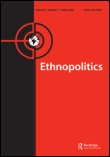
Ethnopolitics
Bridging Cultures Through Rigorous ScholarshipEthnopolitics is a premier academic journal published by Routledge Journals, Taylor & Francis Ltd, dedicated to advancing the study of cultural dynamics, historical contexts, and political relations shaping ethnic identities and conflicts. With its Q1 ranking in both Cultural Studies and History, alongside a Q2 ranking in Political Science and International Relations, the journal is recognized for its high impact within the social sciences. It aims to foster interdisciplinary dialogue by publishing cutting-edge research that explores the complexities of ethnopolitical phenomena across the globe. Researchers, professionals, and students alike will benefit from the journal's commitment to insightful analysis and rigorous scholarship, as it strives to contribute to policy discussions and enhance our understanding of ethnic diversity's role in contemporary societal structures. The journal is accessible through various platforms, encouraging broad readership and engagement with pivotal studies from 2010 through 2024.

Analecta Politica
Advancing political discourse for a global audience.Analecta Politica is a distinguished academic journal dedicated to the exploration of political science in a global context, published by the Universidad Pontificia Bolivariana. Since becoming an Open Access publication in 2011, it has fostered a platform for scholars, researchers, and practitioners to disseminate their work freely, thereby enhancing the accessibility and impact of research in the field. With a commitment to advancing knowledge in areas such as governance, policy analysis, and international relations, Analecta Politica serves as an essential resource for understanding contemporary political dynamics. The journal encourages contributions that stimulate critical dialogue and promote innovative research, making it a vital tool for those engaged in political studies and related disciplines. With its continuous development and dedication to quality scholarship, Analecta Politica stands out as a key player in the advancement of political science research in Latin America and beyond.
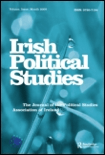
Irish Political Studies
Exploring the Dynamics of Irish PoliticsIrish Political Studies, published by Routledge Journals, a prestigious entity under Taylor & Francis Ltd, is a leading journal in the field of political science and sociology with a notable impact factor that exemplifies its academic significance. Established in 1986, this journal has built a strong reputation for publishing high-quality, peer-reviewed research that addresses contemporary issues in Irish politics, as well as broader themes in international relations and political sociology. The journal is categorized in the Q2 quartile for both Political Science and Sociology, signifying its high influence among academic publications, and ranks 213 out of 706 in Political Science on Scopus. Although not designated as an Open Access journal, it remains a vital resource for researchers and practitioners seeking to deepen their understanding of the dynamic political landscape in Ireland and beyond. With an editorial commitment to inclusivity and interdisciplinary approaches, Irish Political Studies continues to engage academics, professionals, and students, fostering insightful discussions that shape the future of political scholarship.
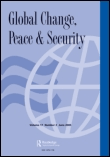
Global Change Peace & Security
Connecting Research to Real-World Peace InitiativesGlobal Change Peace & Security is a prominent scholarly journal published by Routledge Journals, Taylor & Francis Ltd, focusing on the intricate interplay between global change and peace efforts within the realms of political science and international relations. With an ISSN of 1478-1158 and an E-ISSN of 1478-1166, this esteemed journal spans from 2008 to 2024, consistently contributing to critical discourse in its field. Ranked in the second quartile (Q2) for both Political Science and International Relations as well as Sociology, it occupies a distinguished position with a Scopus ranking of 134 out of 706 and a percentile standing of 81st in Political Science. The journal’s objective is to bridge the gap between theoretical frameworks and functional policy discussions, thereby fostering dialogue that addresses contemporary challenges in global governance and human security. By offering rich, research-based insights and analysis, Global Change Peace & Security serves as a vital resource for academics, practitioners, and policy-makers committed to advancing peace and security amidst pervasive global transformations.